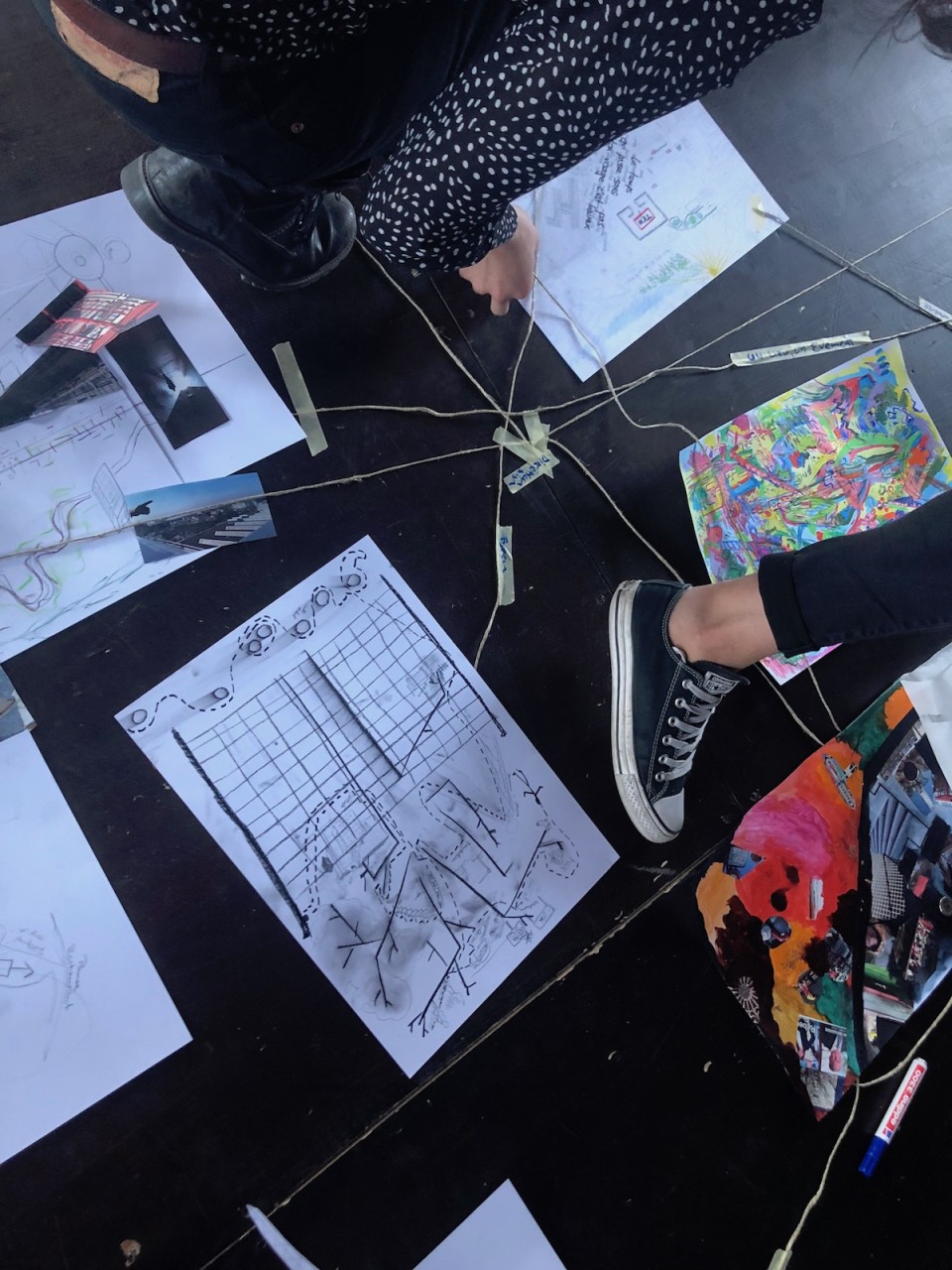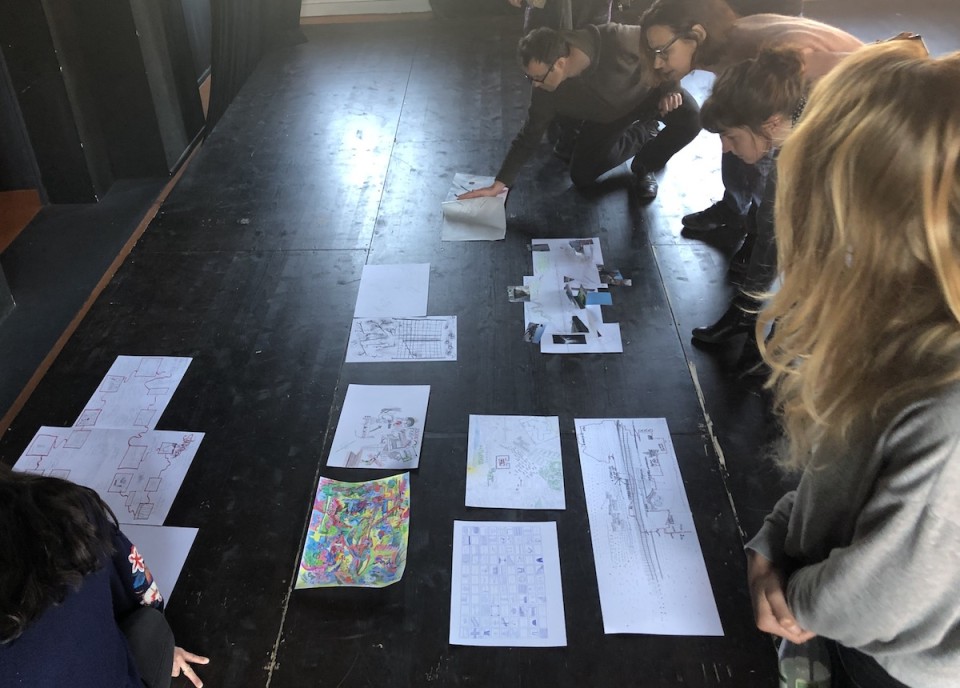Lab dérive urbaine et cartes mentales
publié le 24.02.2019
Workshop organisé en février 2019 conjointement avec Ulrich Fischer (Expert en storytelling digita), Agnès Perreten-Lopez (architecte) et Floriane Facchini (auteur, metteuse en scène) à la Manufacture, Haute École des Arts de la Scène à Lausanne (CH).
L’objectif de ce workshop était de partir d’une déambulation urbaine collective pour créer des cartes mentales subjectives, à partir des choses vues, senties et imaginées durant cette dérive de quelques heures.
L’enjeu final était de produire des objets artistiques, sous forme de performances, installations ou de projets hybrides (réel / virtuel), à partir de ces cartes mentales nous servant de « partitions » d’intuitions et d’intentions.
Le parcours de la semaine
Le déroulé de ce workshop de 5 jours était le suivant, jour par jour:
Cadrage et objectifs, avec exemples et discussions sur les enjeux et les méthodes
Dérive collective et création de la carte mentale
Finalisation de la carte mentale et création de petits groupes de travail
Création de l’objet artistique, répétitions
Restitution collective
Commencer à prendre pied dans le réel d’un territoire.
texte de Ulrich Fischer
Autant le nombre de projets artistiques réalisés sur base d’arpentages participatifs, de dérives situationnistes ou de déambulations créatives est vaste (il s’agit presque d’une discipline artistique en soi), autant il n’est pas évident de convoquer toutes ces pratiques artistiques, en relation avec les écrits des théoriciens et des penseurs anciens (avec notamment l’art de la mémoire), pour créer un objet théâtral qui puisse un minimum correspondre aux attendus du métier.
En effet, le défi consistait de s’octroyer la liberté de penser au delà du texte (la partition littéraire), de la boite noire (l’espace théâtral) et de l’objet à poser dans le monde selon un rituel donné (la pièce pour spectateurs, un soir). Tout en prenant en considération la réalité d’un territoire, dans ce qu’elle est de plus triviale et fonctionnelle, avec ses absurdes et ses problèmes criants, en la regardant pour ce qu’elle est, en l’écoutant sans trop de filtres préalables.
Comment des créatifs des arts de la scène pourraient-ils s’approprier une réalité urbaine complexe, banale, sans fin et fond, pour apporter leur contribution à ce territoire composé principalement de gestes urbanistiques et architecturaux…? Est-ce qu’il y a une place pour l’art et la création dans un espace urbain où l’on sent avant tout une volonté de maîtrise qui ne s’accorde que très peu avec ses propres failles ?
Comment des étudiants ne connaissant pas ce bout de territoire pourraient-ils interpréter ses enjeux spécifiques, entrer en dialogue avec l’espace urbain pour au final lui raconter une histoire de leur cru ?
Un territoire peut en cacher un (ou plusieurs) autres
Pour corser plus l’affaire et afin de rendre nos efforts plus « contemporains », nous avons tenté « d’injecter » un peu de monde digital, relié au territoire via nos usages géolocalisés. Avec comme premier vecteur, les photographies réalisées avec nos smartphones, mais également des captations audio et vidéo, ou l’enregistrement du parcours par le GPS.
Serait-il possible de profiter des outils et du potentiel du numérique pour alimenter la réflexion sur le geste créatif, pour garder trace de ce processus de fabrication (au-delà de ce billet) et pour planter des petites graines virtuelles dans le territoire, à même de lui insuffler des devenirs poétiques et alternatifs ?
Il va sans dire que nous n’avons pas pu répondre à toutes ces questions, nombreuses et complexes, mais que ce n’est que partie remise.
Ce billet est donc comme un témoin que l’on pourrait faire passer vers un futur projet, où d’autres acteurs (de théâtre ou simplement des acteurs de leur quotidien) pourraient reprendre cette attitude spécifique à la dérive: une concentration ouverte, un vagabondage obsessionnel, un laisser aller des émotions simples…
En se disant que le territoire est comme un livre, libre à être interprété, libre à être malaxé, avalé, digéré et replanté selon des méthodes qui ne sont pas que celles des métiers de la ville.
WORKSHOP URBAN DRIFT AND MENTAL MAPS
Workshop organised in February 2019 jointly with Ulrich Fischer (Expert in digita storytelling), Agnès Perreten-Lopez (architect) and Floriane Facchini (author, director) at the Manufacture, Haute École des Arts de la Scène in Lausanne (CH).
The objective of this workshop was to start from a collective urban wandering to create subjective mental maps, based on things seen, felt and imagined during this drift of a few hours.
The final challenge was to produce artistic objects, in the form of performances, installations or hybrid projects (real/virtual), from these mental maps serving as "scores" of intuitions and intentions.
The process of the week
The course of this 5-day workshop was as follows, day by day:
Framing and objectives, with examples and discussions on issues and methods
Collective drift and creation of the mind map
Finalisation of the mind map and creation of small working groups
Creation of the artistic object, rehearsals
Collective restitution
Starting to gain a foothold in the reality of a territory
text by Ulrich Fischer
The number of artistic projects based on participatory surveying, situationist drifts or creative wandering is vast (it is almost an artistic discipline in itself), but it is not easy to bring together all these artistic practices, in relation to the writings of ancient theorists and thinkers (notably the art of memory), to create a theatrical object that can at least correspond to the expectations of the profession.
Indeed, the challenge consisted in granting oneself the freedom to think beyond the text (the literary score), the black box (the theatrical space) and the object to be placed in the world according to a given ritual (the play for spectators, one evening). All the while taking into consideration the reality of a territory, in its most trivial and functional aspects, with its absurdities and its glaring problems, looking at it for what it is, listening to it without too many prior filters.
How can creative people from the performing arts appropriate a complex, banal urban reality, without end and background, to contribute to this territory composed mainly of urbanistic and architectural gestures...? Is there a place for art and creation in an urban space where one senses above all a desire for mastery that is only slightly in tune with its own flaws?
How can students who do not know this part of the territory interpret its specific issues, enter into a dialogue with the urban space and ultimately tell it a story of their own?
One territory can hide another (or several)
To spice things up and to make our efforts more 'contemporary', we tried to 'inject' a bit of the digital world, linked to the territory via our geolocalised uses. The first vector was photographs taken with our smartphones, but also audio and video recordings, or the recording of the route by the GPS.
Would it be possible to take advantage of the tools and potential of digital technology to fuel reflection on the creative gesture, to keep track of this process of making (beyond this post) and to plant small virtual seeds in the territory, capable of breathing poetic and alternative futures into it?
It goes without saying that we have not been able to answer all of these questions, which are numerous and complex, but that this is only a temporary solution.
This post is therefore like a witness that we could pass on to a future project, where other actors (of the theatre or simply actors of their daily life) could take up this specific attitude to drifting: an open concentration, an obsessive wandering, a letting go of simple emotions...
By saying that the territory is like a book, free to be interpreted, free to be kneaded, swallowed, digested and replanted according to methods that are not only those of the city's professions.

